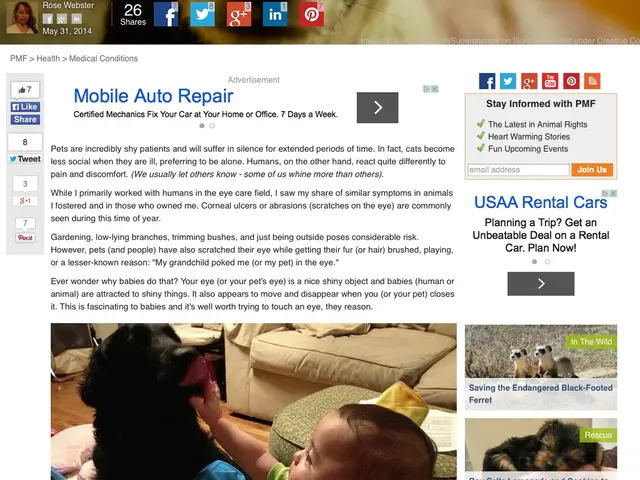Transform Inner Criticism with Artificial Intelligence: Craft a More Compassionate Inner Dialogue
In the realm of personal development, a revolutionary approach is emerging that harnesses the power of artificial intelligence (AI) to help individuals reshape their thought patterns and rewire their inner critic. These AI tools, primarily mental health apps and chatbots, are designed to facilitate cognitive behavioural therapy (CBT) techniques, offering a digital companion for those seeking to improve their self-talk.
One such AI chatbot, Woebot, has garnered attention for its effectiveness, with peer-reviewed research backing its ability to reduce depressive symptoms by guiding users to challenge automatic negative thoughts and practice healthier self-talk. This AI-powered tool engages users in conversations based on CBT principles, activating brain areas responsible for executive control, emotion regulation, and attention shifting, which are crucial for rewiring thought patterns.
Other AI therapy chatbots offer conversational support that feels empathetic and includes guided questions to uncover emotions and promote cognitive restructuring. These tools act as digital talk therapists, assisting users in becoming aware of inner critic messages and replacing them with constructive affirmations.
In addition to these chatbots, users can leverage AI for personalized prompts that delve deeper into emotional clarity and encourage positive self-reflection. These prompts can be crafted within tools like ChatGPT or other AI platforms that allow customized therapy-style interactions, aiding in the development of new thought habits.
The process of rewiring the inner critic involves turning the voice into a voice that helps instead of hurts. This transformation is achieved through regular practice, reflection, and the use of AI-driven tools. Morning Mindset Reset involves asking AI for affirmations that boost self-belief, while Evening Reframe & Release involves using AI journaling prompts to identify and challenge negative thoughts. Reflection prompts like "What negative thought came up today? How would a friend respond to that thought?" are used during the afternoon. Journaling one thing appreciated about oneself is part of the morning routine.
It's important to note that while AI can be a valuable supplement, it is not a replacement for professional therapy. Living under the influence of an unchecked inner critic can lead to lower self-esteem, chronic anxiety and stress, procrastination, burnout, and emotional fatigue. AI tools should not be expected to produce overnight results, as mindset change takes time. It's safe to start small, such as committing to using an AI tool for 7 days and tracking self-talk changes.
AI does not tire, does not humiliate, does not allow off-days, only listens, thinks, and acts. This makes it an ideal companion in the quest for self-improvement. Sharing personal thoughts with AI should be done cautiously, as information is encrypted but privacy policies should be read.
In conclusion, the best AI tools for rewiring an inner critic and improving self-talk primarily center around AI-powered mental health apps and chatbots designed to facilitate cognitive behavioural therapy (CBT) techniques. With regular and careful use, these tools can help change how one thinks about themselves, little by little, healing and transforming beliefs towards a more positive and supportive self-dialogue.
- AI-powered mental health apps and chatbots, like Woebot, have demonstrated success in reducing depressive symptoms by guiding users to challenge negative thoughts and practice healthier self-talk, thereby facilitating cognitive behavioral therapy (CBT).
- These AI chatbots engage users in conversations based on CBT principles, stimulating brain areas responsible for executive control, emotion regulation, and attention shifting, which are essential for rewiring thought patterns.
- Users can also utilize AI for personalized prompts that encourage positive self-reflection, aiding in the development of new thought habits as part of a self-improvement journey.
- While AI can be a valuable tool in the realm of personal development, it is essential to remember that AI is not a substitute for professional therapy, and mindset change takes time and consistent practice.




